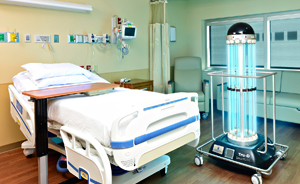 Your Safe Recovery
Your Safe Recovery
As the nation battles a rise in antibiotic-resistant infections and superbugs, it’s important to follow these steps to prevent infection.
What we do:
- Our staff understands that hand hygiene is the single most effective way to prevent hospital infections. We wash our hands often and follow all Centers for Disease Control guidelines to safeguard patients during their hospital stay.
- We sterilize all medical equipment and supplies, and use advanced black-light monitoring systems to look for hidden germs.
- We use gloves and other protective gear with every patient every time contact with blood or other body fluids is possible. Patients whose conditions pose risks to others remain in single rooms with isolation precautions, such as the use of masks, gloves or gowns, to prevent spreading germs to others.
Antibiotics & Infections
The misuse and overuse of antibiotics can produce strains of increasingly resistant germs, such as Methicillin Resistant Staphylococcus Aureus (MRSA) that can cause serious infections.
To protect yourself and others, ask if the antibiotics you are prescribed are necessary, take them as directed and don’t insist on antibiotics if your doctor doesn’t advise them – in or out of the hospital.
What you can do:
- Wash your hands or use an alcohol-based hand sanitizer every time you use the restroom or handle anything that might be a germ carrier (soiled sheets, a bedpan, used tissues, TV remote or cell phones).
- Don’t be afraid to ask your doctors, hospital staff and visitors to wash their hands when they enter your room.
- Be sure to keep the dressing around a wound dry and clean. Let a nurse know immediately if it gets wet or begins to loosen.
- Keep IV catheter sites clean and dry. If any redness appears, the dressing comes loose or any tubing connections become dislodged, tell your nurse.
- If you must have a urinary catheter, ask your doctor or nurse what you can do to help speed its removal.
- Be sure everyone involved in your care knows of any medical conditions, such as diabetes, that may affect your healing.
- Tell family or friends who are sick to send you a get-well card instead of dropping by for a visit.
- Before surgery, ask what you can do to help prevent surgical site infections (stop smoking, bathe frequently with antimicrobial soap and don’t shave near where your surgical incision will be).
What visitors can do:
- Use the hand sanitizer in patient rooms when entering and leaving. Cover your cough or sneeze with a tissue or your sleeve, and do not sit on patient beds or handle their equipment. Clean your hands after sneezing, coughing, touching your eyes, nose, or mouth, after using the restroom and before and after eating and drinking.
- Stay home if you have had any ill symptoms within the last three days, including nausea, vomiting, diarrhea, fever, uncontrolled cough or rash.
- Check with the nurse before you bring food, flowers or children.
- If the person you are visiting is on “isolation precautions,” talk to the nurse before entering the room to find out what steps you will have to take, such as wearing a mask or other protective clothing.
Preventing infection at home:
- Wash hands frequently with soap and water or alcohol-based hand cleaners.
- Keep open sores covered with a bandage.
- Avoid close contact with people who are coughing or otherwise appear ill.
- Cough or sneeze into a tissue or into your upper sleeve, instead of your hands. Always discard used tissues and then wash your hands.
- If you have signs of flu-like illness, stay home from work and keep children home from school or daycare, and avoid other public places.
- Disinfect commonly touched surfaces such as countertops, door handles, sinks, phones, TV remotes and baby changing tables. Use a disinfectant wipe or a clean dry cloth or paper towel (not a sponge or used dishcloth) with a disinfectant spray.
- Avoid sharing personal items, such as drinking glasses, utensils, razors, toothbrushes, face cloths and bath towels.
For more information, please call Sarasota Memorial’s Infection Prevention & Control Department at 941-917-1745.